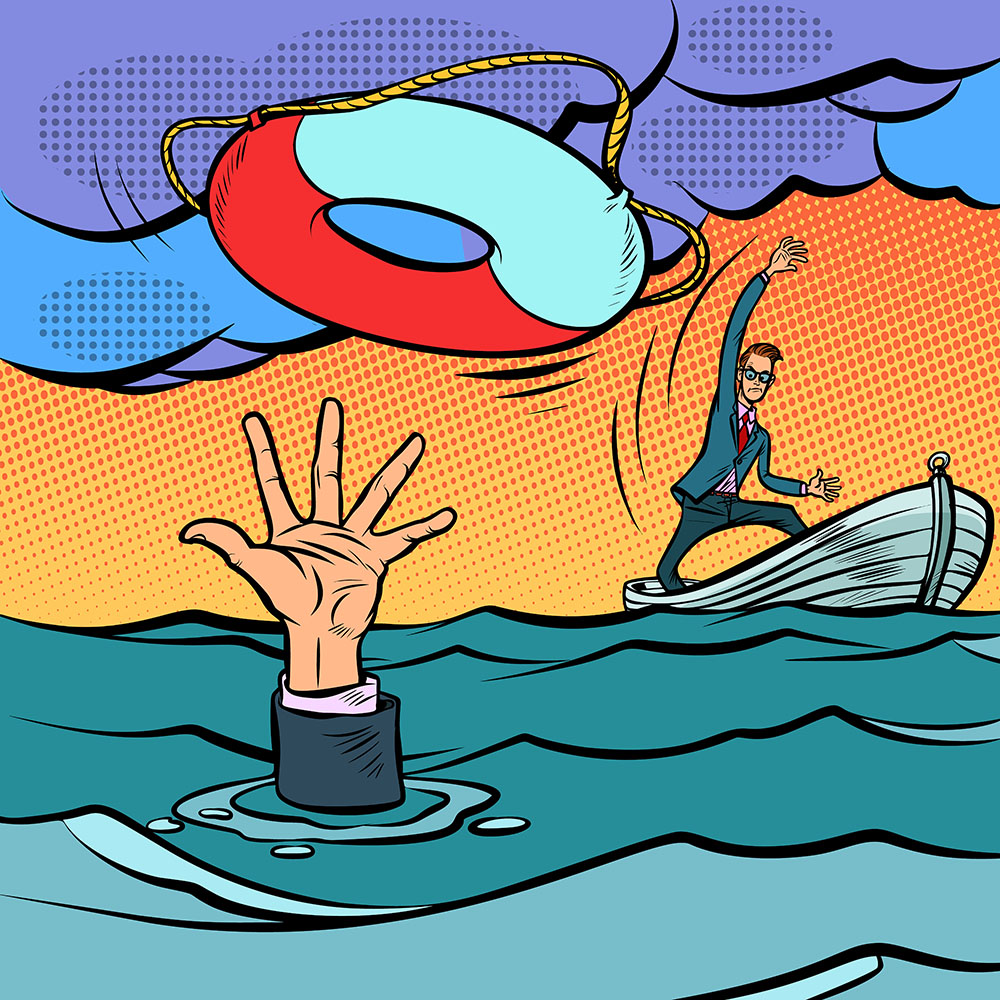- Call: 0203 427 3507
- Email: innovation@clustre.net

Clustre has just completed a series of popular ‘Virtual Coffee Breaks’. These free, 30-minute, buzz-sessions have offered a welcome break from self-isolation. People have been able to catch up with other WFH executives… exchange ideas on best practice… and listen to experts sharing insights on subjects of vital topical importance.
For this article, we have drawn heavily on the thoughts of three expert speakers:
Simon Wheeldon, the Chief Customer Officer at CloudApps, spoke on the subject: How can AI, behavioural science and gamification be harnessed to manage and motivate remote sales forces?
Mike Blackadder, the Chief Customer Officer at Artesian Solutions, talked on the topic: How can WFH sales people access relevant, real time data when isolated from normal sources of sales intelligence?
John O’Connor, the CEO of Deep-Insight, focused on: How to read client minds and understand what they are thinking and saying about you… from an enforced distance.
We are indebted to all three for their revealing insights. And it was very striking how consistently they emphasised the same themes and thought processes. Here are some of the ‘red threads’ that ran through all of their talks…
‘Keep calm and carry on’ – the government’s plucky 1939 mantra – is strangely out of step with the covid-19 crisis. This is not bombed-out, ‘business as usual’, Britain. With people losing their lives to an invisible enemy and many businesses on their knees, this is the moment for building trust; not for grabbing sales.
Our message is simple: Be sensitive enough to realise this is not the time to hard-sell. It’s the moment to support.
The outspoken MD of one UK food retailing giant expressed this sentiment very bluntly. He warned that anyone trying to sell him anything during this pandemic would never – ever – do business with his company. But anyone offering support – such as helping to meet the massively increased demand for home deliveries – would win his instant respect and long-term loyalty.
And that is a powerful message we must take with us out of lockdown. We are all going to need a lot of help – and for some while to come.
Every day, our inboxes are crammed with emails from companies solicitously enquiring after our health and reassuring us that, despite lockdown, they are still resolutely here to serve us. Then some, with shameful insincerity, instantly switch to hard-sell pitching mode:
“Dear Mike, I trust you and your family are well. These are strange times – but don’t worry, we are still here and will continue to provide our services. Indeed, I wanted to drop you a quick line to remind you of what we can offer at times like these… “
This kind of communication is obviously generic and deeply disingenuous. The feigned interest and concern are just a cheap charade. Such emails (and their senders) deserve to be consigned to the junk file.
By contrast, savvy sales managers take the trouble to make their emails intensely personal. They start by researching the company they are contacting, often using sales intelligence tools such as Artesian Solutions, for niche insights. Then, they weave this intelligence into a personal note that talks about the impact of the current crisis and ends with a genuine offer of support:
“Dear Mike, I see in the news that you are having to scale back operations during this tragic crisis. Coming on the back of such sustained growth last year, this must be intensely disappointing for you. But it was really heartening to hear that you are using some of your spare capacity to provide much-needed support for the NHS.
For our part, we have put in place contingency plans to make sure we are able to continue to support you through this challenging period. Please let me know if there is anything more we can do to help in these difficult times. You can count on our support.”
This is so much more in-tune with the client’s mindset. It demonstrates you are attentive and aware of what is going-on in your client’s world. You are not looking to win business but to support someone you genuinely respect. This, in turn, builds a deeply personal and enduring bond of trust.
But, of course, there is a hidden agenda – and that brings us to the next key point…
With many staff on furlough, focusing your reduced resources to best effect is paramount. But what are your best opportunities? The social and business landscape is so fractured and chaotic that priorities quickly become confused.
As Simon Wheeldon of CloudApps explained, AI holds a vital key to unlocking the answers. AI can search for patterns – spotlighting what has worked well in the past to help you focus your forces most effectively in the future. Marshalling your lean resources is crucial in this crisis – and it will be even more critical as we crawl out of lockdown.
But forensic analysis of behaviours is only part of the answer – human psychology may prove to be an even bigger and more complex issue. And by far the biggest human challenge lies close to home…
The initial novelty of working from home has, for some staff, given way to a mounting sense of anxiety and loneliness. It is hard to get people to do anything – let alone refocus their priorities – when they have no idea if they will keep their job… or even have one in the ‘new normal’.
Uncertainty stress-tests business leaders to new limits. This is especially true when it comes to the softer, human skills of people management…
Sensitive leaders appreciate that work is much more than a job, an income and a chance to achieve. Work dignifies human endeavour. It gives us focus, self-worth and confidence. It also provides a vital focal point… chance encounters around the coffee machine or water fountain foster social interplay, a healthy exchange of ideas, a vital esprit de corps and enduring bonds of friendship. When people are denied these simple social encounters, they lose an important emotional and psychological anchor. So, providing that stability quickly becomes a leadership priority…
Senior executives now have to work harder to empathise and engage. They must appreciate that many people live in cramped, shared accommodation where working from home presents very real challenges. Don’t assume that everyone is coping just because they don’t ask for support. Reach out and check that people are not hiding or disguising their anxieties. Listen and openly discuss the worries of working from home. Proactively ask people if there is any support they need. And stay connected… regular contact is deeply appreciated because it provides the social interplay that is such a crucial part of working life.
And a key part of that interplay is… play.
If you really want to motivate people – especially salespeople – introduce an element of competition. This is the ‘drug’ of choice for ambitious, goal-driven people. Gamification certainly helps to motivate sales executives (and many other staff) who might otherwise struggle to maintain their sense of self-worth in the face of covid-led falling revenues.
Simon Wheeldon provided some useful context when he described how Vodafone’s 350-strong digital sales team has embraced gamification. Used to working in an extremely communal environment, they are now all working from home and participating in daily and weekly competitions…
“These competitions are usually built around a combination of KPI’s and behaviours”, Simon explained. “They often start by plotting the behaviours that drive lead-indicators and those that drive lag-indicators. It is then easy to select six (or so) key behaviours that will deliver the focus and control you need.
“By gamifying these behaviours – typically this could be a competition around the number of ‘can I help you?’ calls to customers – you can really motivate salespeople who are struggling to hit their (lag-indicator) revenue targets. You can also include a few fun themes that might make working from home a lot less lonely and a great deal more enjoyable.
“Many companies are naturally falling back on measuring what their people are doing, and when they are doing it. This can provide a great foundation for coaching – but initially, some people will find this difficult and challenging, so do explain the purpose and the personal value of this exercise”.
To break the tedium of home alone working, companies have been commendably inventive in their programme of communications and emotional support. They have staged group Yoga and Pilates classes… run quizzes and held meditation sessions… staged games of Charades and Pictionary… enjoyed Zoom ‘social’ drinks every Friday night… set aside time after daily video conferences to chat about non-business topics – everything from favourite film choices to best dinner recipes. These initiatives are all part of keeping people connected and fostering a very real bond within virtual communities.
For the last lockdown lessons, we turn to John O’Connor – CEO of Deep-Insight. Expressed with customary clarity, here are his four top priorities for life in the ‘new normal’…
“The covid-19 pandemic is primarily an issue of human safety and, quite naturally, people are acutely concerned. So, tell your customers – and your own people – what you are doing to contribute to their safety. This will provide reassurance and sustain trust”.
“Empathy is more important now than ever. Long-term relationships involve a degree of give and take – now is the time to give more than to take”.
“Remember, communication works two ways – it’s listening just as much as talking. Right now, it should be more listening than talking”.
“Your staff are your primary interface with clients. So, treat them in precisely the same way that you would treat key customers – with respect, honesty and genuine concern”.
The headline to this article contained one word that has now assumed massive importance: Forever.
The lessons of lockdown are not just a quick fix to get us through a crisis. They are the permanent normal; not a temporary abnormal. And the evidence for this came in a recent breaking news flash. On Wednesday 13th May, the BBC reported that Twitter is allowing its employees to work from home on a “forever” basis. What is more, this was no vague statement of intent, it was a personal commitment made by the CEO, Jack Dorsey, in a company-wide email.
“We were uniquely positioned to respond quickly and allow folks to work from home given our emphasis on decentralization and supporting a distributed workforce capable of working from anywhere… The past few months have proven we can make that work. So, if our employees are in a role and situation that enables them to work from home and they want to continue to do so forever, we will make that happen.”
We strongly suspect that Twitter is just the first in a flood of companies that will follow suit. Working-from-Home is not just a pandemic phenomenon, it will become the new norm in many industries. A reality that will turn our lockdown lessons into a permanent playbook for senior management.

Ian Spencer is a founding partner of Clustre – The Innovation Brokers. To learn more about Clustre and our innovation community, click here.